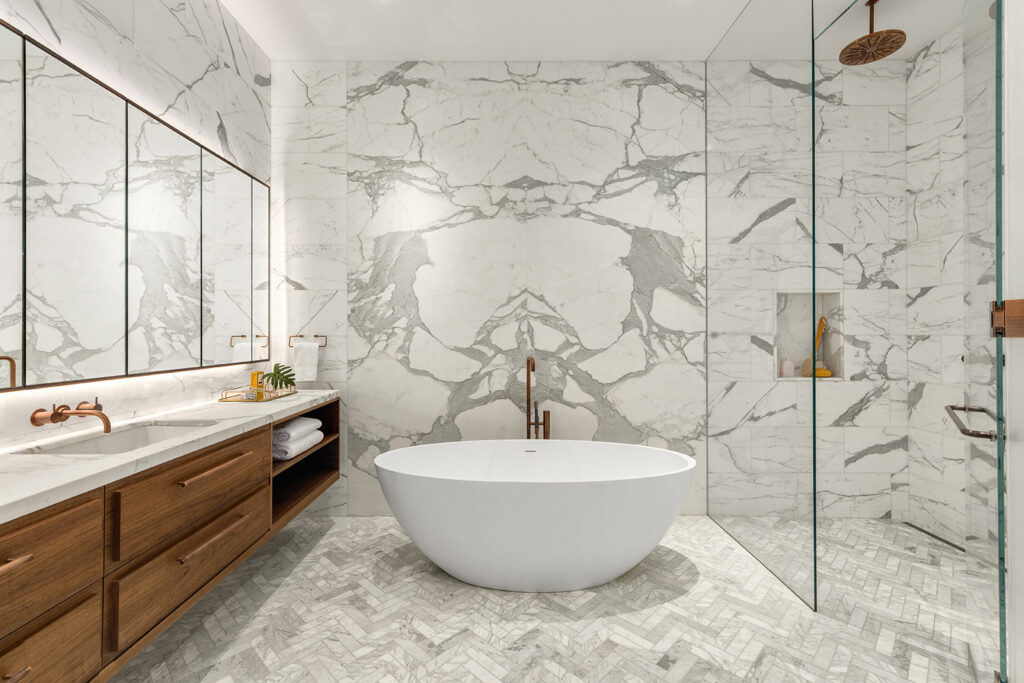One-Piece vs Two Piece Toilet – Pros and Cons- 2025 Expert Guide
When upgrading your bathroom, one of the most important—and often overlooked—decisions is choosing between a one-piece or two-piece toilet. While
Ever wonder how much a new bathtub is gonna cost you? Between the materials, the installation fees and just the space in your bathroom, it can be very overwhelming. So today, we will be breaking down how much you are looking to spend for a new addition to your bathroom today.
The short answer is a new bathtub costs anywhere around $500 for the tub itself. This number drastically changes depending on the material of the bathtub, placing most bathtubs anywhere between $500-2,000 and beyond if you want a more durable and unique material for your bathtub.
When purchasing a new bathtub there are a few key factors to consider: Size, Weight and Material. Material will generally inform the first two, so that should generally be your priority as you each bathtub material offers different advantages and disadvantages and you should consider each carefully as it will generally inform what size and styles your bathtub will be available in.
The greatest factor in determining your bathtub’s price will be it’s material. Material dictates how the bathtub feels to bathe in, it’s heat retention, difficulty to install, durability and of course, it’s appearance.
Outside of material, size is also an important factor in determining bathtub price.
Bear in mind this only covers the tub itself. Depending on the size of your bathtub you will also have to pay heavier install costs, with smaller bathtubs being much cheaper to install than a large bathtub. Installation costs can vary anywhere between $200-$1,000 depending on the contractor and the size of your tub.
As with most things, brand also greatly impacts pricing. If you want a brand name bathtub then be prepared to spend a little extra to get a tub made by that company.
When installing a new bathtub for your home, factor in these additional costs to your project to get a complete picture of your final costs:
Installation costs will usually cost almost as much as your bathtub if not more, so you should be careful when choosing your bathtub.
This cost will vary significantly from contractor to contractor, but generally, the more difficult your bathtub is to maneuver and install, the more expensive it will be for you. This goes hand in hand with removing and disposing of your old bathtub. Generally, if removal and installation is difficult or time-consuming for your contractors, you will foot the bill.
Depending on the bathtub you choose, you may need to reroute your plumbing and electrical outlets to prevent any mishaps. This will require you to hire both an electrician and a plumber to inspect your connections and configure a new layout. In general, it is advised that you choose a bathtub that does not require extra logistics to install to avoid this.
This is the only step in the project that you have no real control over. Material scarcity is quite common in home repair projects, and you will simply have to foot the bill for the increase in material costs. While this may not be common when it comes to bathtub installation or removal, this will be a factor when buying the bathtub you want as you will need to pay a higher cost for in-demand bathtub materials.
Another hidden cost is the amount of maintenance and care you will need for your bathtub. Certain materials will need weekly cleaning, and all materials do not respond well to the presence of water, which can result in stains and potential material penetration depending on the type of material you choose. In general, natural stone, copper, stone resin, and steel require the least amount of maintenance.
Today there are bathtubs for just about any bathroom size and any home. Of course they are pricey investments, so be sure to do your research and get only what you need-it will be worth it in the long run.

Eric is the founder and president of Badeloft USA. He has been the president of Badeloft’s US division for over ten years and oversees all marketing and branding aspects of Badeloftusa.com.
His expertise lies in small business development, sales, and home and bathroom industry trends and information.
Contact us with any business related inquiries.

Free material samples and tub templates
When upgrading your bathroom, one of the most important—and often overlooked—decisions is choosing between a one-piece or two-piece toilet. While
Small details, including what you place on the floor, can make a big difference when setting up or upgrading your
Plumbing traps may seem like small components, but they are critical in keeping your home safe and odor-free. Two of
When shopping for new bath linens, the difference between a bath towel and a bath sheet can feel subtle, but
Fill out the form below to request a free material sample
"*" indicates required fields
"*" indicates required fields
"*" indicates required fields